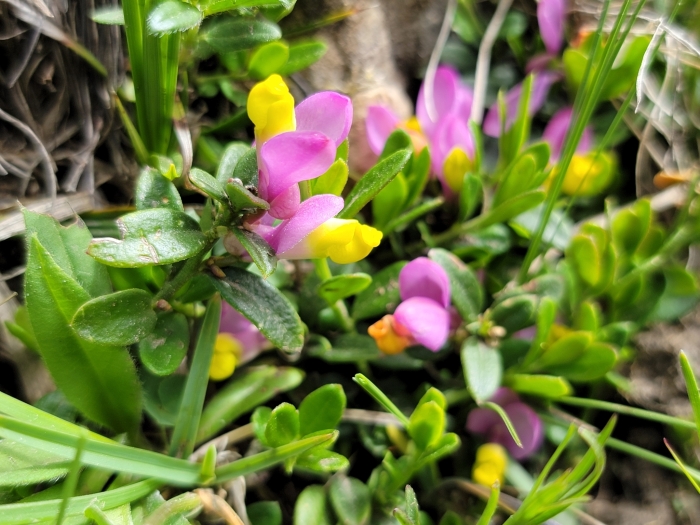Shrubby Milkwort
(Polygaloides chamaebuxus)
Shrubby Milkwort (Polygaloides chamaebuxus)
/
/

Elias
CC BY 4.0
Image By:
Elias
Recorded By:
Copyright:
CC BY 4.0
Copyright Notice:
Photo by: Elias | License Type: CC BY 4.0 | License URL: http://creativecommons.org/licenses/by/4.0/ | Rights Holder: Elias | Publisher: iNaturalist | Date Created: 2021-06-23T10:38:35-07:00 |











































Estimated Native Range
Summary
Polygaloides chamaebuxus, commonly known as Shrubby Milkwort, is an evergreen subshrub native to the understory of mountainous forests and alpine regions in Central and Southeastern Europe. It typically grows to a height of 0.5-0.8 feet and a width of 0.8-2 feet. This plant is characterized by its compact, spreading habit and small, glossy, oval leaves. The flowers are particularly notable for their unique appearance, with showy, pea-like blooms in shades of cream, yellow, purple, and white that emerge in the spring and can persist into winter, depending on the climate.
Shrubby Milkwort is valued for its year-round foliage and the charming, bicolored flowers that provide early season interest. It is suitable for rock gardens, alpine beds, and as ground cover in border fronts or over walls. It thrives in full sun to part shade and prefers well-drained soils, tolerating a range of soil types from sandy to loamy. While it requires medium to high amounts of water, it is important to avoid waterlogged conditions. The plant’s history in cultivation dates back to at least 1658, and it has been awarded the Royal Horticultural Society’s Award of Garden Merit, indicating its exceptional performance in gardens. Some potential problems include root rot if the soil is not well-drained and infestations by aphids. It is not known for being invasive and is generally disease-resistant.CC BY-SA 4.0
Shrubby Milkwort is valued for its year-round foliage and the charming, bicolored flowers that provide early season interest. It is suitable for rock gardens, alpine beds, and as ground cover in border fronts or over walls. It thrives in full sun to part shade and prefers well-drained soils, tolerating a range of soil types from sandy to loamy. While it requires medium to high amounts of water, it is important to avoid waterlogged conditions. The plant’s history in cultivation dates back to at least 1658, and it has been awarded the Royal Horticultural Society’s Award of Garden Merit, indicating its exceptional performance in gardens. Some potential problems include root rot if the soil is not well-drained and infestations by aphids. It is not known for being invasive and is generally disease-resistant.CC BY-SA 4.0
Plant Description
- Plant Type: Subshrub
- Height: 0.5-0.8 feet
- Width: 0.8-2 feet
- Growth Rate: Moderate
- Flower Color: Cream, Yellow, Purple, White
- Flowering Season: Spring, Winter
- Leaf Retention: Evergreen
Growth Requirements
- Sun: Full Sun, Part Shade
- Water: Medium
- Drainage: Medium, Fast
Common Uses
Border Plant, Deer Resistant, Drought Tolerant, Fragrant, Groundcover, Low Maintenance, Rabbit Resistant, Rock Garden, Salt Tolerant
Natural Habitat
Understory of mountainous forests and alpine regions
Other Names
Common Names: Milkwort, Buchs-Kreuzblume, Zwergbuchs
Scientific Names: , Polygala chamaebuxus, Polygala chamaebuxus var. grandiflora, Polygaloides chamaebuxus, Chamaebuxus alpestris, Polygala chamaebuxus var. rhodoptera, Polygala chamaebuxus var. purpurea, Chamaebuxus alpestris var. grandiflora, Chamaebuxus coriacea, Chamaebuxus polygaleoides
GBIF Accepted Name: Polygaloides chamaebuxus (L.) O.Schwarz